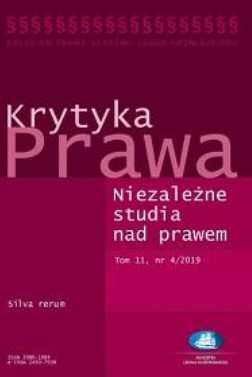Przestępstwo niealimentacji – efekt
nowelizacji oraz postulaty de lege ferenda
The Crime of Failure to Pay Maintenance
– the Effect of Amendments
and Propositions de lege ferenda3
Author(s): Bolesław LaszczakSubject(s): Law, Constitution, Jurisprudence, Criminal Law
Published by: Akademia Leona Koźmińskiego
Keywords: penal populism; maintenance; Treasury; recoverability; debt, efficiency; propositions.
Summary/Abstract: The amendment of Article 209 of the Polish Criminal Code, which took place on 31 May 2017 with the entry into force of the Act of 23 March 2017 on Amendments to the Criminal Code Act and the Act on Assistance to Persons Entitled to Maintenance (Journal of Laws of 2017, item 952), resulted in significant changes not only in the wording of the said article itself, but also in the picture of the statistical effects of pre-trial and court proceedings for the crime in question. From the very beginning, the said amendment raised questions and reservations among a substantial number of supporters of the established line of judicial decisions issued in the domain of criminal law. They considered it unfit to keep to the principles of adequacy and proportionality, as well as posing a threat to a significant – and ultimately destructive – increase in the burden on law enforcement authorities and the judiciary in general. At the same time, taking into account the main objectives and ideas of the amendment, which was intended in particular to improve the enforcement of maintenance obligations, it needs to be said that it proved ineffective and was actually a manifestation of penal populism.
Journal: Krytyka Prawa
- Issue Year: 14/2022
- Issue No: 3
- Page Range: 50-66
- Page Count: 17
- Language: Polish

